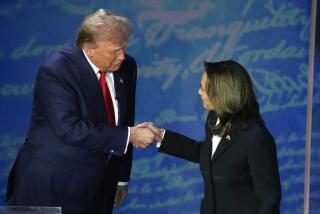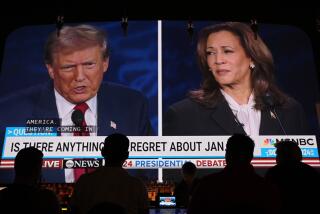Finally Face to Face, Candidates Deepen Their Division on Iraq
- Share via
CORAL GABLES, Fla. — President Bush and Sen. John F. Kerry increased the odds that the voters’ verdict on the war in Iraq will decide the November election, as they deepened their disagreement over the conflict during a sharp but civil debate Thursday night.
Overall, the two men raised few new arguments. But they offered starkly different visions of how America should pursue its goals in the world, how a president should lead and, most emphatically, whether the ongoing war in Iraq had enhanced or diminished American security.
Continuing the tougher tone that he had unveiled in recent weeks, Kerry described the war as a “colossal error of judgment” that had weakened American security by diverting attention and resources from the pursuit of the Al Qaeda terrorist network.
“Saddam Hussein didn’t attack us,” Kerry declared in one of his most forceful moments. “Osama bin Laden attacked us.”
Bush insistently declared that the war would reduce the long-term threat of terrorism by encouraging the spread of democracy in the Middle East and allowing the United States to take the offensive against terrorists.
But the president sometimes seemed exasperated and even angry as Kerry pressed his case against him; at one point, Bush even apparently sighed in frustration, a distant echo of the behavior that hurt Vice President Al Gore in his first debate against Bush in 2000.
The debate came with Bush holding a lead in recent national surveys, but also facing resurfacing doubts about the war amid rising violence in Iraq. Several initial surveys Thursday found that most voters thought Kerry won the encounter.
Those initial reactions suggest the debate may help Kerry regain some of the ground as a potential commander in chief and strong leader that he has lost since his party’s convention in July amid withering Republican attack. But the full political effect probably won’t be apparent for several days as the arguments between the contenders reverberate through their campaign appearances.
The key political question may be whether the debate allows Kerry to shift the focus of the race away from uncertainties about his personal qualities back toward doubts about Bush’s performance and priorities.
“I think Kerry got in the game,” said Norman Ornstein, a political analyst at the American Enterprise Institute. “You could imagine him as president ... if you decide that the other guy doesn’t deserve four more years.”
Debates have had a mixed effect on presidential races. In 1960, 1980 and 2000, they proved a turning point. In each of those contests, the candidate trailing in the last Gallup Poll before the first debate -- John F. Kennedy in 1960, Ronald Reagan in 1980 and Bush in 2000 -- pulled ahead after the debate and won in November. But in 1984, 1988, 1992 and 1996, debates didn’t change the race’s trajectory.
Small rhetorical gestures offered large clues to the campaigns’ contrasting strategies. Bush, who depends heavily on the votes of the most religiously observant Americans, several times referred to prayer. Kerry, returning to the emphasis of his convention in July, repeatedly referred to his experience in combat and touted his support from generals and other retired military officers.
Bush was often at his best in the encounter when he was most visionary. Many of his most effective moments came when he echoed his argument from his acceptance speech at the Republican National Convention last month and portrayed the war in Iraq as a crucial first step in a generation-long effort to reduce the threat of terrorism by encouraging the spread of democracy in the Middle East.
“We have a duty to defeat this enemy,” Bush said. “The best way to defeat them is to never waver, to be strong, to use every asset at our disposal, to constantly stay on the offensive and, at the same time, spread liberty.”
But Bush may have been weakest in offering specifics on how he would improve the situation in Iraq. On that question, he offered mostly resolve.
Kerry presented an inverse picture: He was stronger on the details than the big picture. He said little about his long-term vision of how to reduce the threat of terrorism, other than to broadly pledge to work more closely with allies and to try to build closer ties with moderate Muslims around the world.
But he showed his prosecutor’s experience by relentlessly driving his case that Bush had bungled the management of the war by failing to provide enough time for diplomacy before invading, failing to provide troops with all the equipment they needed, and failing to plan adequately for the aftermath.
“He rushed the war in Iraq without a plan to win the peace,” Kerry said. “Now that is not the judgment that a president of the United States ought to make.”
Apart from a moment when the two praised one another’s family, the 90 minutes offered a parade of differences large and small.
Kerry insisted that the best way for America to pursue its aims and enhance its security was to build strong alliances. “I believe America is safest and strongest when we are leading the world and we are leading strong alliances,” he declared in his first answer.
Bush also pledged to work with other nations, but he pointedly reaffirmed his reluctance to bend when he believes he is acting in America’s interest. “Trying to be popular, kind of, in the global sense, if it’s not in our best interest, makes no sense,” he said. “I’m interested in working with other nations and do a lot of it. But I’m not going to make decisions that I think are wrong for America.”
The differences were just as stark on an issue that had rarely received as much attention in a debate: how a president leads. Bush was unwavering in his insistence that a president should be ... unwavering.
Repeatedly, Bush declared that Kerry had sent “mixed signals” by shifting his positions on Iraq. Over and again, Bush said resolve and determination were key to success against the long-term threat of terrorism.
“As the politics change, his positions change, and that’s not how a commander in chief acts,” Bush said.
Kerry repeatedly argued that resolve was not enough. “I believe in being strong and resolute and determined,” he said. “But we also have to be smart.” Later he said it was critical that a president be able to learn and change from experience.
With those arguments, each man targeted a principal vulnerability of the other. In surveys, many voters have expressed concerns that Kerry lacks core convictions and changes positions too frequently; meanwhile, voters have been more likely to describe Bush as stubborn or reckless.
In an ABC News survey of 531 debate viewers Thursday night, 45% thought Kerry had won the encounter, 36% picked Bush, and 17% called it a tie. That verdict, however, did not change the immediate preferences in the race itself. Bush still held a 4-percentage point lead, just as he did in the previous ABC poll.
For those seeking to instantly assess the debate’s political effect, the first 2000 debate between Bush and Gore offers a cautionary example. Though many observers thought Gore won more of the exchanges in that debate, the Bush campaign clearly won the debate’s aftermath by accusing the vice president of misrepresenting the facts in several of his assertions.
That charge, combined with questions about whether Gore showed disrespect for Bush by sighing loudly during some of his answers, helped Bush regain the lead in the race by reopening doubts for many voters about Gore’s veracity and personality.
Mike McCurry, a senior advisor to Kerry, said the campaign expected Bush to repeat the effort this time by seizing on aspects of the debate to accuse the Democrat of flip-flopping. “We are conscious of that and we will have a 48-hour plan,” he said.
Bush and his senior aides seemed especially exercised about two comments from Kerry. Bush reacted sharply when Kerry suggested that the war in Iraq had helped Osama bin Laden recruit terrorists.
“Osama bin Laden isn’t going to determine how we defend ourselves,” Bush insisted.
After the debate, Karl Rove, Bush’s senior political advisor, said the president was likely to return to that point. “The idea that by attacking the terrorists we’re doing them a favor ... that’s a pre-9/11 mind-set of the worst sort,” Rove said.
More to Read
Get the L.A. Times Politics newsletter
Deeply reported insights into legislation, politics and policy from Sacramento, Washington and beyond. In your inbox twice per week.
You may occasionally receive promotional content from the Los Angeles Times.










